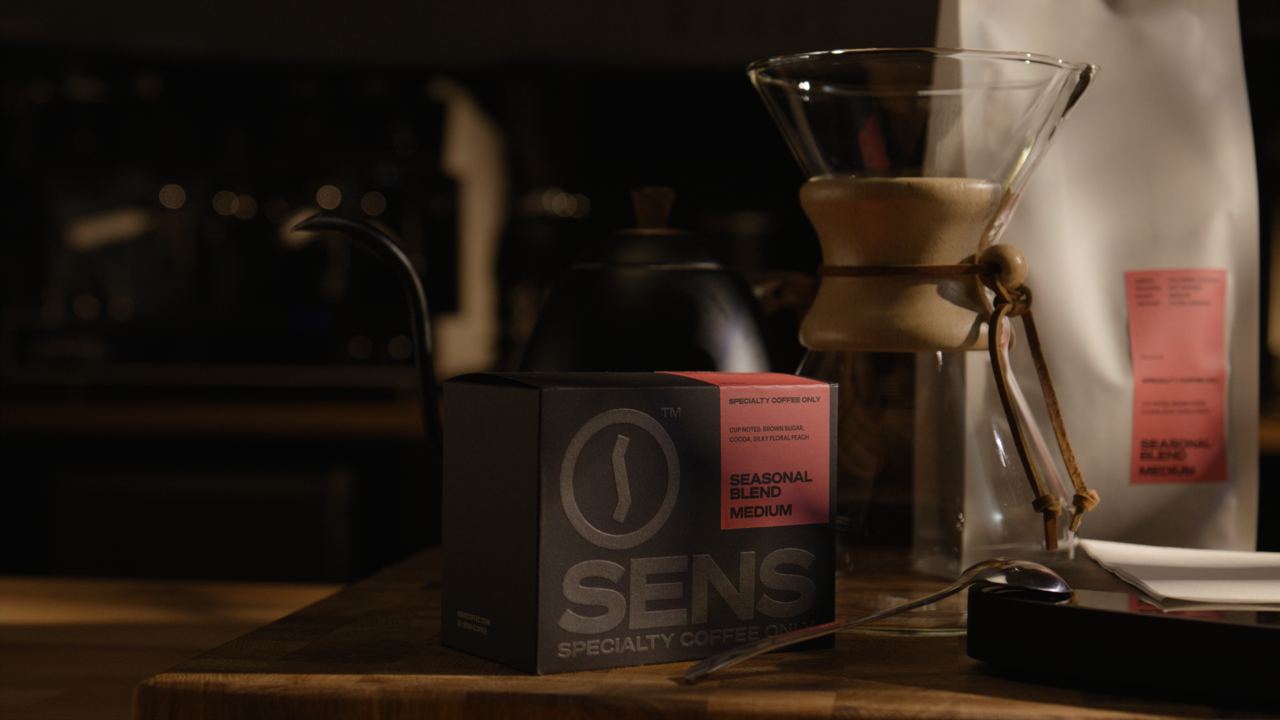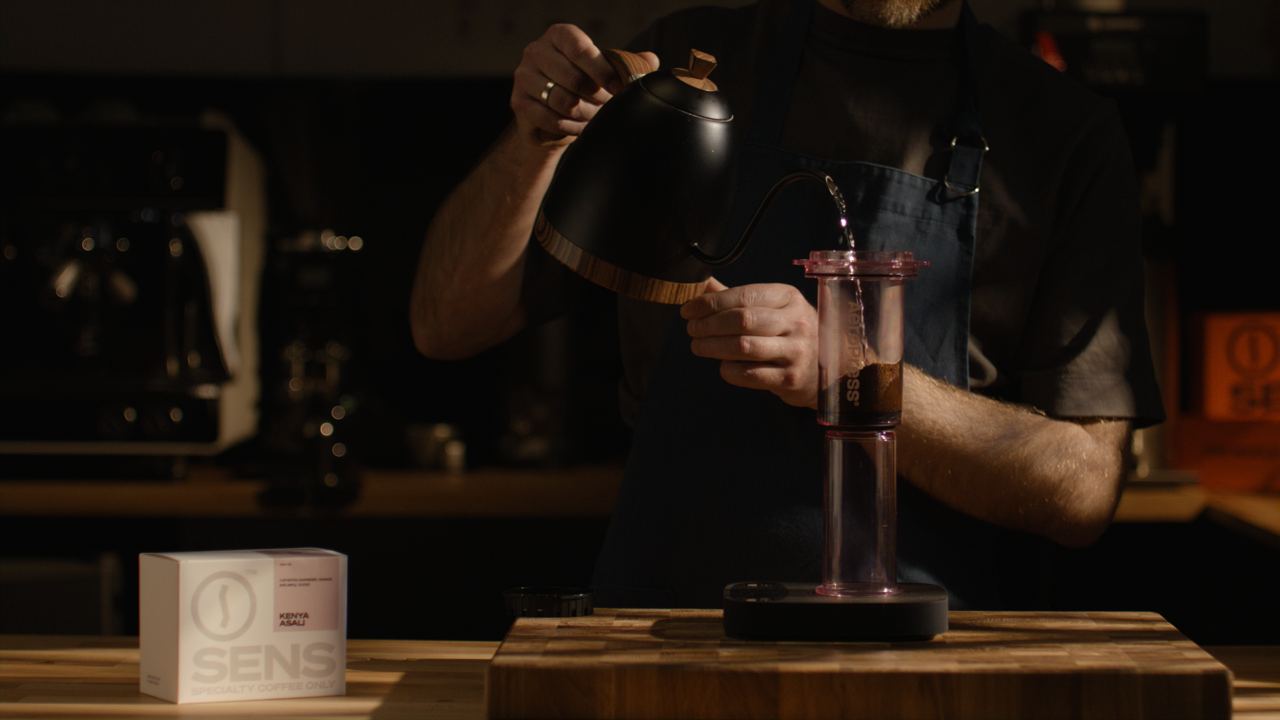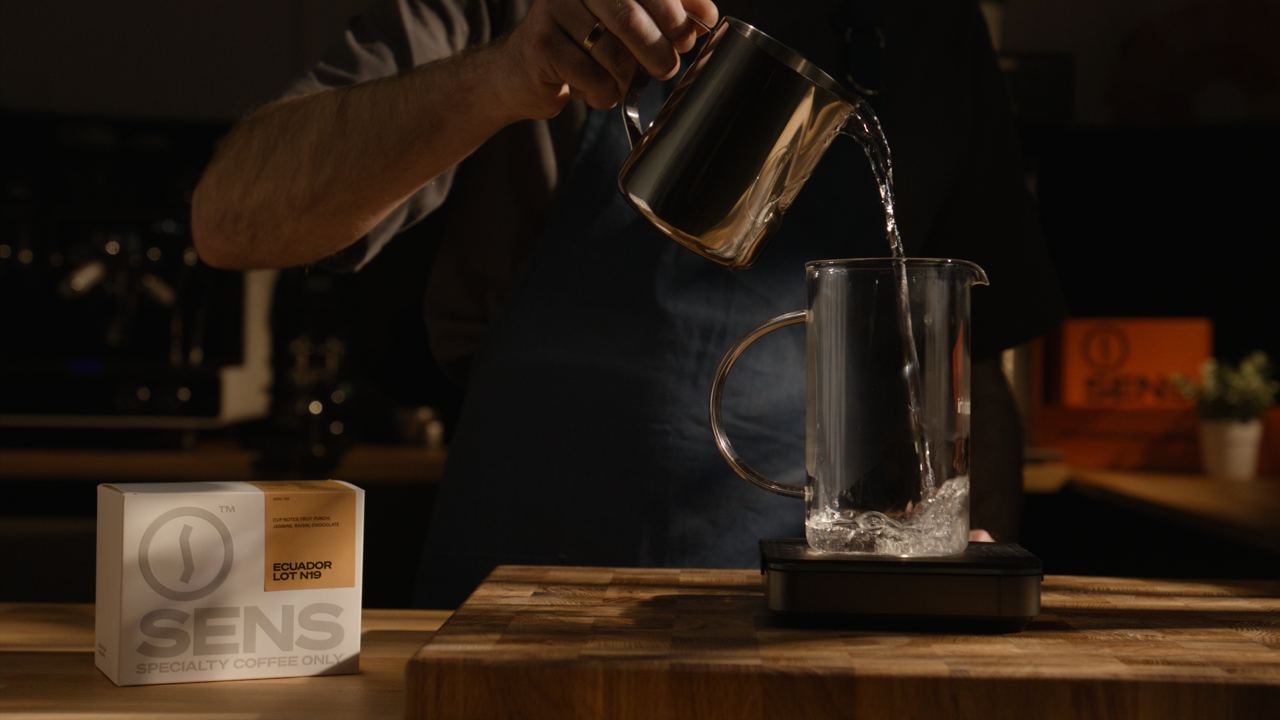
3 important factors:
- The Plant's Genetics & Environment
- Processing Methods
- Roast style
Why Does Your Coffee Taste Like Strawberries?
It’s not magic — it’s the result of three powerful forces working together:
- The Bean’s DNA & Birthplace – The coffee variety and its exact patch of earth shape its flavor just like a wine grape’s terroir.
- The Art of Processing – From sun-drying whole cherries to carefully washing the beans, each method leaves a distinct taste fingerprint.
- The Roaster’s Touch – The right roast doesn’t just cook the beans — it unlocks their hidden notes, from sparkling fruit to velvety chocolate.
☕ When these three align, you get that unforgettable sip — the one that makes you wonder if coffee can really taste like ripe summer berries.
It Starts With Terroir
At SENS Coffee, we know that every extraordinary cup begins long before it’s brewed. Those surprising hints of berries, stone fruits, chocolate, or caramel aren’t accidents — they’re written into the bean’s story from the very start.
Terroir is the magic word. It’s the unique mix of soil, climate, and altitude where coffee grows. A great terroir produces beans brimming with natural aromatics — delicate florals, bright citrus, and subtle sweetness — all locked inside the green coffee bean, waiting to be revealed.
Three Forces Behind the Flavor
The Bean’s DNA & Birthplace
Like wine grapes, a coffee’s variety and growing environment shape its flavor. Nutrient-rich soil, balanced rainfall, sun exposure, and cooler high-altitude. We will add this post to the website so if someone wants to continue reading they can be moved to the website
“temperatures slow bean development, creating complex sugars and acids. Varieties like Gesha or certain Ethiopian heirlooms are famous for their floral and fruit-forward profiles.
-
The Art of Processing
After harvest, the way the coffee cherry is handled can transform its taste: - Natural (Dry) Process – Cherries are dried whole, letting the fruit’s sugars seep deep into the bean, producing bold berry and tropical fruit notes.
- Washed (Wet) Process – The fruit is removed before drying, giving a cleaner, brighter cup with crisp citrus and floral notes.
-
The Roaster’s Touch
Roasting is where the bean’s personality is revealed. A skilled roast will highlight the origin’s character while layering in caramel sweetness, chocolate undertones, or velvety textures — balancing the lively fruit notes with warmth and depth.
The Journey in Your Cup
Those strawberry or blueberry notes aren’t “flavor added” — they’re nature’s gift. They come from specific regions, meticulous farming, precise processing, careful transport, and artful roasting.
It’s a labor of love — and when all three forces align, your coffee sings like a perfectly composed symphony in a cup.
☕ Next time you taste ripe summer berries in your morning brew, you’ll know the story it’s been waiting to tell.

Published: February 25, 2025
Bartholomew Jones and Renata Henderson, a dynamic husband-and-wife team from Memphis, are transforming the coffee industry with their venture, Cxffeeblack. Established in 2019, Cxffeeblack is more than a coffee brand; it's a movement aimed at reclaiming coffee's African heritage and promoting Black ownership within the industry.
Reclaiming Coffee's African Roots
Coffee's origins trace back to Africa, yet the industry's profits seldom benefit Black communities. Jones and Henderson are addressing this disparity by sourcing beans directly from Black farmers and importers, ensuring that Black individuals own the land, the beans, and the businesses involved. This approach not only honors coffee's African roots but also fosters economic empowerment within Black communities.
Community-Centric Initiatives
Cxffeeblack extends beyond coffee production; it serves as a cultural hub in Memphis' Highland Heights neighborhood.The Anti-Gentrification Cxffee Club, established by the duo, offers a space where Black culture is celebrated, and specialty coffee is accessible without cultural compromise. This initiative challenges traditional coffee shop models and addresses issues related to gentrification.
Educational and Cultural Exchange Programs
The company has launched the Barista Exchange Program, connecting Black and African baristas through cultural and educational exchanges. In 2023, this program facilitated trips to Ethiopia and Rwanda for Black American baristas and plans to bring African baristas to Memphis in 2024, fostering a global community within the coffee industry.
Recognition and Future Aspirations
Cxffeeblack's innovative approach has garnered significant recognition. The company received the inaugural "Innovator of the Year" award from the Coffee Coalition for Racial Equity and was honored as the Global Notable Roaster of the Year in the 15th Annual Sprudgie Awards. These accolades underscore the impact of their mission to reshape the coffee industry by centering Black narratives and ownership.
Through Cxffeeblack, Jones and Henderson are not only redefining coffee culture but also paving the way for a more equitable and inclusive future in the industry.

Coffee prices experienced a notable decline today, influenced by growing concerns over consumer spending. May arabica coffee futures decreased by 2.83%, while March ICE robusta coffee futures fell by 3.06%.
Factors Contributing to the Decline
The drop in coffee prices is primarily attributed to a significant decrease in the U.S. consumer confidence index, which fell by 7 points in February, reaching an eight-month low of 98.3. This decline has raised apprehensions about reduced consumer spending, potentially impacting demand for commodities like coffee.
Additionally, an increase in ICE-monitored arabica coffee inventories has exerted downward pressure on prices. Stocks have risen to 792,695 bags, rebounding from a nine-month low of 758,514 bags observed last week.
Impact of Weather Conditions
Adverse weather conditions in key coffee-producing regions have also played a role. Brazil's largest arabica coffee-growing area, Minas Gerais, received only 24% of its historical average rainfall last week, which could affect future coffee yields. Global Supply Considerations
Despite recent declines, coffee prices have been influenced by supply constraints. Brazil's coffee exports in January decreased by 1.6% compared to the previous year, totaling 3.98 million bags. Furthermore, forecasts suggest that Brazil's 2025/26 coffee crop may fall by 4.4% to a three-year low of 51.81 million bags.
In Vietnam, the world's largest producer of robusta coffee, production in the 2023/24 crop year dropped by 20% due to drought, marking the smallest crop in four years.
Conclusion
The recent decline in coffee prices reflects a complex interplay of factors, including consumer spending concerns, inventory levels, and weather-related supply challenges. Stakeholders in the coffee industry will need to monitor these developments closely to navigate the evolving market landscape.

Recent research indicates that consuming coffee in the morning is associated with significant health benefits, whereas drinking coffee throughout the day may not offer the same advantages and could potentially pose health risks.
Health Benefits of Morning Coffee
A study analyzing data from over 40,000 U.S. adults found that those who limited their coffee intake to the morning hours experienced notable health benefits:
-
Reduced Mortality Risk: Morning coffee drinkers were 16% less likely to die from any cause compared to non-coffee drinkers.
-
Lower Cardiovascular Mortality: These individuals also had a 31% reduced risk of death from cardiovascular diseases.
These findings suggest that morning coffee consumption aligns better with the body's natural circadian rhythms, potentially enhancing its health benefits.
Potential Risks of All-Day Coffee Consumption
Conversely, the study noted that individuals who consumed coffee throughout the day did not experience the same health benefits. Continuous coffee intake may disrupt circadian rhythms and reduce melatonin levels, a hormone crucial for cardiovascular health and reducing oxidative stress.
Recommended Coffee Consumption Practices
To maximize the health benefits of coffee while minimizing potential risks:
-
Limit Intake to Morning Hours: Consuming coffee between 4 a.m. and noon is associated with reduced mortality risks.
-
Moderate Consumption: Health experts recommend limiting coffee intake to no more than three cups per day to maximize benefits and minimize adverse effects.
-
Be Mindful of Additives: The health benefits of coffee can be influenced by added ingredients such as sugar and cream. Opting for black coffee or using minimal additives is advisable.
In summary, enjoying coffee during the morning hours in moderation may offer significant health benefits, while extending consumption throughout the day could negate these advantages and potentially introduce health risks.

The recent suspension of funding by the United States Agency for International Development has raised significant concerns within the global coffee industry. Historically, the agency has played a pivotal role in supporting agricultural development, including coffee production, in many developing countries. The abrupt cessation of these funds threatens to disrupt various initiatives aimed at enhancing the sustainability and profitability of coffee farming.
USAID has invested in several key projects to bolster the coffee sector. In 2020, the agency facilitated the inaugural Ethiopia Cup of Excellence competition, providing Ethiopian coffee farmers with a platform to showcase their products. In 2014, amidst a coffee leaf rust epidemic in Latin America, USAID committed ten million dollars to combat the crisis, helping farmers protect their livelihoods. Between 1978 and 2018, USAID's agricultural development projects yielded substantial returns, with every dollar spent generating approximately eight dollars in economic impact, primarily benefiting low-income, developing countries.
The suspension of USAID funding poses several risks to the global coffee industry. Many initiatives focused on improving coffee quality, sustainability, and market access are now in jeopardy, potentially stalling progress in these areas. Smallholder farmers who rely heavily on support from development programs may face financial hardships, leading to decreased productivity and quality. The halt in funding could also worsen existing challenges within the coffee supply chain, affecting everything from production to export processes.
Beyond the coffee sector, the funding freeze may have wider economic and social repercussions. The cessation of aid has led to significant layoffs in various countries, with thousands of workers losing their jobs as development projects come to a halt. The withdrawal of USAID support could hinder emerging economies' ability to attract private investment, affecting sectors beyond agriculture.
The freezing of USAID funds represents a substantial setback for the global coffee industry and poses challenges for broader development efforts. As stakeholders navigate this uncertain landscape, exploring alternative funding sources and collaborative strategies will be crucial to sustaining the progress achieved over the past decades.

While many rely on coffee to boost alertness, some individuals find it ineffective or even experience increased fatigue after consumption. Several factors contribute to these varied responses:
Genetic Differences in Caffeine Metabolism
Genetics significantly influence how individuals process caffeine. Variations in specific genes, particularly the CYP1A2 gene, determine the speed at which caffeine is metabolized. Fast metabolizers break down caffeine quickly, potentially reducing its stimulating effects, while slow metabolizers may experience prolonged effects, leading to jitteriness or disrupted sleep.
Developing Caffeine Tolerance
Regular consumption of caffeine can lead to tolerance, where the body becomes accustomed to its effects, necessitating higher doses to achieve the same level of alertness. Over time, this can render standard amounts of coffee less effective in promoting wakefulness.
Impact of Adenosine and Sleep Pressure
Caffeine works by blocking adenosine receptors in the brain. Adenosine is a neurotransmitter that promotes sleepiness as it accumulates throughout the day. By inhibiting these receptors, caffeine temporarily wards off drowsiness. However, once the caffeine's effects diminish, accumulated adenosine can bind to its receptors, potentially leading to a sudden onset of fatigue.
Influence of Circadian Rhythms
The body's internal clock, or circadian rhythm, regulates sleep-wake cycles. Consuming coffee at times misaligned with one's circadian rhythm, such as late in the day, can interfere with natural sleep patterns, resulting in diminished alertness and increased tiredness.
Blood Sugar Fluctuations
In some individuals, caffeine can cause spikes in blood sugar levels, followed by rapid declines. These fluctuations may lead to feelings of lethargy or sluggishness after the initial stimulating effects wear off.
Dehydration Effects
Caffeine has diuretic properties, increasing urine production and potentially leading to dehydration if fluid intake isn't adequately maintained. Dehydration is a known factor in causing fatigue, which might counteract the energizing effects of coffee.
Underlying Health Conditions
Certain health issues, such as sleep disorders, depression, or chronic fatigue syndrome, can influence how one's body responds to caffeine. In such cases, coffee may not provide the desired alertness and could exacerbate feelings of tiredness.
Recommendations for Optimal Caffeine Consumption
To maximize the benefits of caffeine and minimize potential adverse effects:
-
Monitor Intake: Limit daily caffeine consumption to moderate levels to prevent tolerance buildup.
-
Timing Matters: Consume coffee during periods when natural alertness is low, typically mid-morning or early afternoon, and avoid intake close to bedtime.
-
Stay Hydrated: Balance coffee consumption with adequate water intake to counteract diuretic effects.
-
Assess Lifestyle Factors: Ensure sufficient sleep, manage stress effectively, and maintain a balanced diet to support overall energy levels.
Understanding these factors can help individuals tailor their coffee consumption habits to align with their unique physiological responses, thereby enhancing the desired stimulating effects.

As global warming threatens traditional coffee cultivation, South Sudan is turning to a rare, climate-resistant species known as excelsa coffee to revitalize its coffee industry and combat poverty.
Excelsa Coffee: A Climate-Resilient Alternative
Discovered over a century ago in South Sudan, excelsa coffee is gaining attention for its resilience to extreme conditions such as drought and heat, as well as its resistance to common pests and diseases. This makes it a promising alternative for regions facing the adverse effects of climate change.
Local Farmers' Aspirations
Farmers like Catherine Bashiama, who had never grown coffee before, are now cultivating excelsa with hopes of improving their livelihoods. After planting seedlings three years ago, Bashiama is optimistic that this crop will provide a stable income and enable her to support her family's education.
Global Coffee Crisis and Excelsa's Potential
The global coffee industry is experiencing challenges due to climate change, with major producers like Brazil reporting significant declines in harvests. In this context, excelsa offers a glimmer of hope. However, it currently represents less than 1% of the global market, and scaling up production faces challenges, including the need for stability in regions like South Sudan.
Revitalizing South Sudan's Coffee Industry
Efforts are underway to revive South Sudan's coffee sector, which was once a significant part of its economy. Initiatives include training farmers in sustainable practices and attracting international interest, with companies like Nespresso exploring the potential of sourcing coffee from the region.
Challenges Ahead
Despite the potential, several obstacles remain, including political instability and the need for infrastructure development.Achieving long-term peace and stability is crucial for the success of these initiatives and for farmers like Bashiama to fully benefit from excelsa cultivation.
In summary, South Sudan's exploration of excelsa coffee presents a promising avenue to combat the challenges posed by climate change on coffee cultivation, offering hope for both the global coffee industry and local communities seeking economic improvement.

In the competitive world of specialty coffee, standing out requires more than following current trends—it demands setting them. The Human Bean, a prominent drive-thru coffee chain, exemplifies this approach by proactively developing seasonal products that not only attract customers but also foster loyalty.
Strategic Planning for Seasonal Offerings
The Human Bean's process for launching new products is meticulous and data-driven. The company engages in year-round planning, beginning each May for the following calendar year. This involves gathering insights from industry trends, evaluating past promotions, and analyzing proprietary research. Such comprehensive planning ensures that each new offering aligns with customer preferences and strengthens brand engagement.
Embracing Consumer Desire for Novelty
Recent studies indicate a growing consumer interest in unique coffee experiences. According to Datassential’s 2025 Food, Flavor & Beverage Trends Report, 62 percent of consumers are eager to try new and unique coffee drinks. This trend underscores the importance for coffee brands to innovate continually, providing fresh and exciting options that cater to evolving tastes.
Leveraging Limited-Time Offers (LTOs)
Limited-Time Offers (LTOs) have evolved into strategic tools for driving customer loyalty. By introducing seasonal beverages, brands like The Human Bean create a sense of urgency and exclusivity, encouraging repeat visits. These offerings not only satisfy the consumer's craving for novelty but also differentiate the brand in a crowded market.
The Role of Creativity and Boldness
To lead in trendsetting, bold creativity is essential. The Human Bean's commitment to developing innovative beverages demonstrates how embracing creativity can result in products that resonate with customers. This proactive approach positions the brand as a leader rather than a follower in the specialty coffee industry.
By investing in strategic planning, understanding consumer desires, and embracing bold creativity, coffee brands can move beyond merely following trends to creating them, thereby achieving sustained growth and customer loyalty.

On March 2, 2025, a couple was arrested at Miami International Airport following a confrontation with airline staff after missing their flight to Cancún, Mexico.
The passengers, identified as Rafael Seirafe-Novaes, 41, and his fiancée, Beatriz Rapoport De Campos Maia, 29, arrived late for their American Airlines flight and attempted to force their way onto the aircraft. During the altercation, De Campos Maia allegedly threw coffee at a staff member.
Video footage shared on social media shows multiple officers responding to the incident, restraining Seirafe-Novaes on the tarmac and escorting him in handcuffs to a police vehicle.
Both individuals were charged with battery and trespassing, with Seirafe-Novaes also facing a charge of resisting arrest without violence.
American Airlines issued a statement condemning the incident, emphasizing that acts of violence are not tolerated and that they are cooperating with law enforcement in the investigation.
Following their release from jail, De Campos Maia denied the allegations, stating that the coffee was accidentally dropped and not intentionally thrown. She claimed that the staff member's accusation was false.
The couple, who are from São Paulo, Brazil, were on their way to Cancún to celebrate their recent engagement. They expressed disappointment over missing their trip and the ensuing incident.
This event highlights the importance of adhering to airport protocols and maintaining composure during travel disruptions to ensure the safety and well-being of all passengers and staff.

Jimmy Butler’s journey into the coffee business began unexpectedly in 2020 during the NBA’s bubble season in Orlando. Looking for a way to take his mind off basketball while capitalizing on a unique opportunity, Butler started selling coffee from his hotel room using a simple espresso machine. Charging a flat rate of twenty dollars per cup, he jokingly named the venture Bigface, reflecting the high price tag.
His first customer was former Miami Heat teammate Goran Dragic, whom Butler affectionately calls his brother in Slovenian. However, Butler recalls that Dragic never actually paid for his coffee, always promising to settle up later but never following through. Despite the unpaid tabs, the experience gave Butler something even more valuable—the realization that he loved connecting with people over a cup of coffee.
During the months inside the bubble, basketball consumed daily life. Making and sharing coffee became a small but meaningful escape, an experience Butler fondly remembers. Once the season ended, he found himself missing those casual, coffee-fueled conversations. That nostalgia planted the seed for what would eventually become a serious business venture.
Four years later, Bigface Coffee has evolved from a makeshift hotel-room operation into a legitimate brand. In December, Butler opened the first physical Bigface café in Miami’s Design District, giving the public access to the exclusive coffee he once served only to fellow NBA players inside the bubble.
The grand opening on December 6 was a star-studded event, with notable guests such as Carmelo Anthony, DJ Khaled, and soccer star Paul Pogba attending. While the celebrity-filled launch might suggest Bigface is just another high-profile athlete’s side project, Butler has been personally invested in every aspect of the business. He has spent offseasons traveling across South America, tasting coffee beans to source for Bigface. The company’s chief operating officer, Britt Berg, formerly worked at Intelligentsia, further demonstrating the brand’s commitment to quality.
Bigface has also provided Butler with unique opportunities to connect with influential figures beyond basketball. One of his most memorable experiences was sitting in Brazil, sharing a cup of his own coffee with soccer legend Neymar.
Reflecting on that moment, Butler described how surreal it was to be in the world’s largest coffee-exporting country, drinking his own coffee alongside one of Brazil’s most famous athletes.
While now playing for the Golden State Warriors following a February trade from the Miami Heat, Butler has remained deeply involved in Bigface. Before his move, he could often be found behind the counter at the café, personally making drinks and chatting with customers. He emphasizes that Bigface is about more than just coffee—it’s about creating genuine human connections.
Rather than focusing on selfies and autographs, Butler encourages customers to engage in real conversations with him and others who visit the shop. Whether it’s a well-known celebrity or a local coffee enthusiast, he hopes Bigface fosters meaningful interactions, making coffee a bridge between people from all walks of life.

In February 2024, Azure Klug transformed Traverse City's Rough Pony into Water Bearer Coffee, creating a space that reflects her passion for coffee, community, and creativity. The name "Water Bearer" honors the Aquarian zodiac sign shared by Klug and several individuals instrumental in the café's development, symbolizing the collective effort behind its success.
A Journey into Coffee
Before entering the coffee industry, Klug managed a tanning salon and took time off to raise her two sons, now eight and nine. Upon returning to work, she joined friends at Brew (now Outpost), where she discovered a love for the dynamic and personal environment of coffee shops. Her ability to remember customers' names and preferences fostered meaningful connections, turning routine visits into engaging experiences.
Klug's desire to create her own space led her to Rough Pony, and by October 2023, she began the process of purchasing the café from previous owner Becky Tranchell, known for Rose & Fern Café. This transition marked the beginning of Water Bearer Coffee.
Creating a Unique Atmosphere
Water Bearer Coffee offers more than just beverages; it provides an experience. Inspired by tarot and zodiac themes, the café features a cozy, mystical ambiance, highlighted by a zodiac mural crafted by local artist Heather Spooner. The inviting environment encourages patrons to linger, fostering a sense of community.
Collaborations with neighboring businesses, such as Darling Botanical, have allowed Klug to cultivate a green space within the café, blending natural elements with the café's aesthetic. Additionally, events like the Full Moon pop-up, hosted by Evil Queen Candles, have brought together local artisans and creatives, offering activities like tarot readings and handcrafted beverages, further enriching the community vibe.
Embracing Community and Overcoming Challenges
Operating a small business comes with its challenges, including seasonal fluctuations and external factors like construction projects affecting foot traffic. Klug acknowledges the hard work involved but remains optimistic, focusing on the café's growth and the support from fellow local coffee shop owners. This camaraderie underscores the strength of Traverse City's coffee community.
Through dedication and a clear vision, Water Bearer Coffee has become a vibrant addition to the Warehouse MRKT, offering a space where coffee, creativity, and community converge.

7 Brew Coffee, a rapidly expanding drive-thru coffee chain, is set to open its first New Jersey location in Toms River. The new outlet will be situated at 1358 Hooper Avenue, within the Hooper Commons shopping center, which also houses retailers like Michael's and Dollar Tree.
The Toms River Planning Board has approved the construction of a 510-square-foot freestanding building in the shopping center's parking lot. This structure will feature a double drive-thru lane, allowing customers to place orders directly from their vehicles. Instead of traditional menu boards, employees equipped with tablets will assist customers by explaining the menu and taking orders.
Established in 2017 in Arkansas, 7 Brew Coffee has rapidly grown to over 200 locations nationwide. The chain focuses exclusively on beverages, offering a variety of coffees, smoothies, shakes, and energy drinks. The Toms River location marks the company's inaugural venture into the Garden State, with plans for further expansion. A franchisee has already signed a lease for a store in Clark, and 7 Brew is listed among the tenants for a new retail center approved for the former Beachwood Mall site on Route 9 in Berkeley.
The introduction of 7 Brew Coffee adds to the growing coffee scene in Toms River, providing residents and visitors with more options to enjoy specialty beverages. The company's innovative drive-thru model aims to offer quick and convenient service without compromising on quality.

